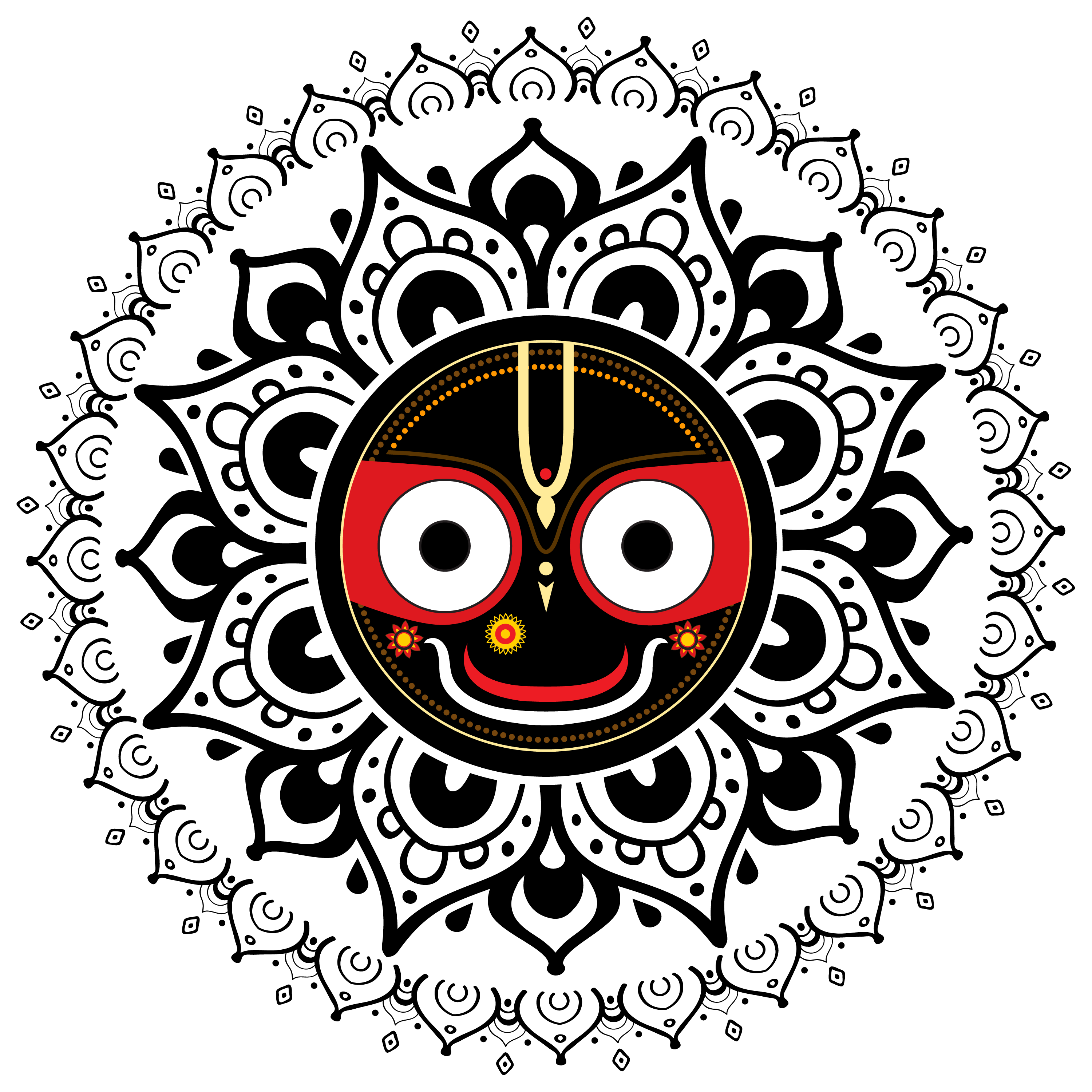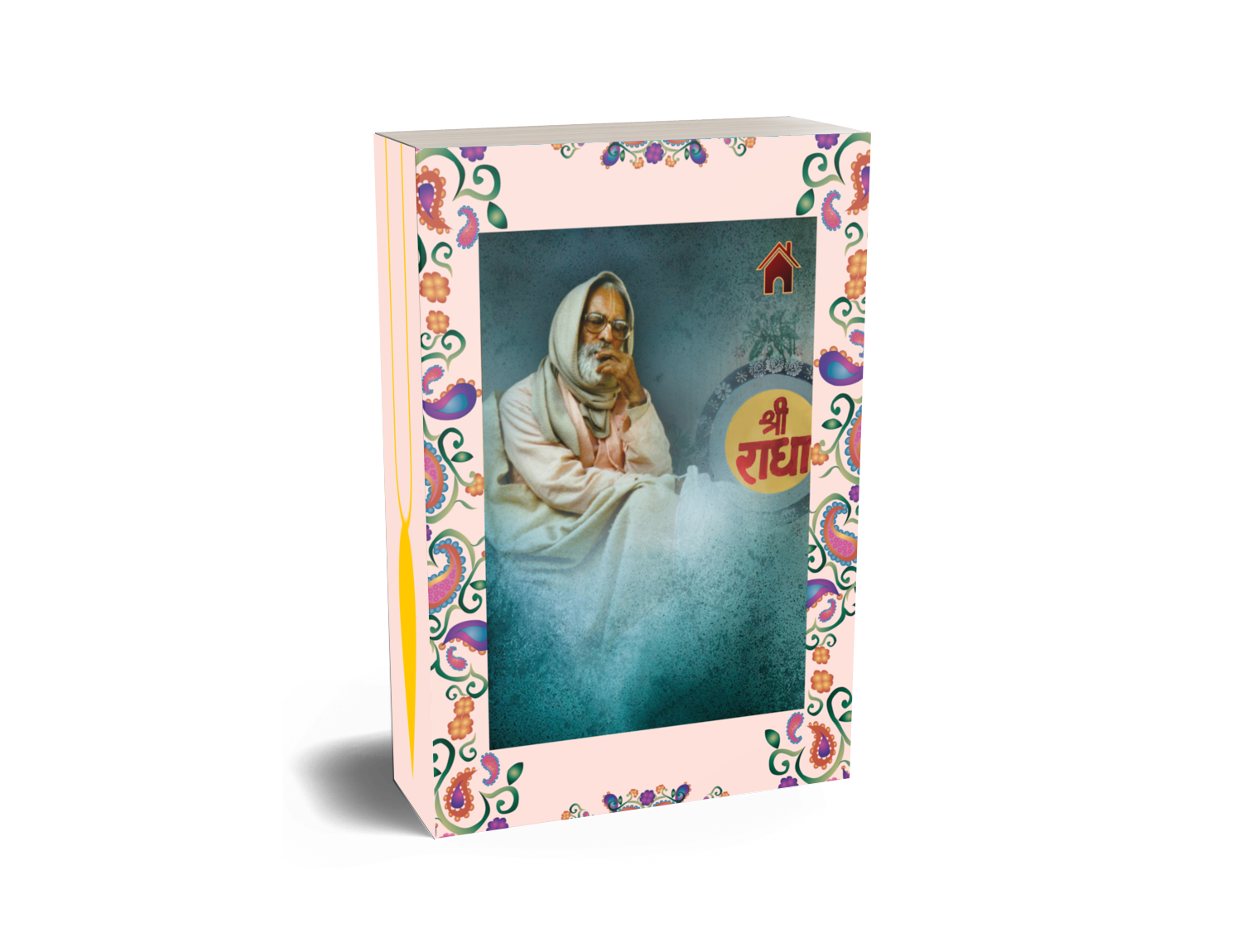

The following is an excerpt from a class on Śrī Śikṣāṣṭakam by Śrīla Bhaktivedānta Nārāyaṇa Mahārāja in Maui, Hawaii, on May 25, 2000
There is no fixed time for taking the Holy Name or not taking it.” Can you chant only after taking bath? No, there  are no such rules. Can you take the Name while bathing? Yes, you can take it. Whether you have taken bath or not, washed your mouth or not, you can chant, ‘Hare Kṛṣṇa Hare Kṛṣṇa Kṛṣṇa Kṛṣṇa Hare Hare, Hare Rāma Hare Rāma Rāma Rāma Hare Hare.’ Even if you are passing stool and urine – Hare Kṛṣṇa Hare Kṛṣṇa – you can chant in your mind. Śrī Caitanya Mahāprabhu did it.
are no such rules. Can you take the Name while bathing? Yes, you can take it. Whether you have taken bath or not, washed your mouth or not, you can chant, ‘Hare Kṛṣṇa Hare Kṛṣṇa Kṛṣṇa Kṛṣṇa Hare Hare, Hare Rāma Hare Rāma Rāma Rāma Hare Hare.’ Even if you are passing stool and urine – Hare Kṛṣṇa Hare Kṛṣṇa – you can chant in your mind. Śrī Caitanya Mahāprabhu did it.
If anyone takes the Name of Rāma, then Hanumān must go there, with thousands and lakhs of bodies. He can go everywhere, at the same time. There was once a person who never had time to chant the Name. Nārada went and told him, “Why don’t you chant the Name, you silly, bogus person?” He answered, “I have no time, I am always busy.” Nārada then asked him, “Are you always busy, even at the time of passing stool and urine?” That person said, “Oh, no, not at that time.” Nārada Muni told him, “Then at that time you should chant.” He replied, “That I can do.”
When he went to pass stool, and he was chanting, “Hare Rāma Hare Rāma”, Hanumān came at once. He was 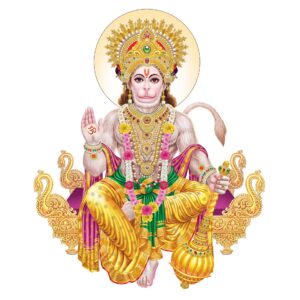 upset and thought, “This bogus person is impure, passing urine and stool.” And he gave him a kick. Hanumān is so powerful that even if he would kick Rāvaṇa, Rāvaṇa would fall over. Even Kumbhakarṇa and Meghanātha would not be able to bear his kick. However, when he kicked this person who was chanting Hare Kṛṣṇa, it was as though nothing had been done. Then Hanumān thought, “This is very wonderful! What happened? I have never seen anything like this. Although he is passing stool and urine and chanting, there is no difficulty or problem.” He was in amazement. Then, in the evening, when he returned to Rāma and knocked on the door, he heard Rāma lamenting. Hanumān entered and asked, “Prabhu, why are you moaning?” Rāmacandra told Hanumān that he had done this to Him. Hanumān asked, “O Prabhu, how could I have done this?” Rāmacandra said, “You know that nāma and nāmī are both the same. When that person was passing stool and chanting, ‘Rāma Rāma Rāma’, I went there in his heart. I was in his body. You kicked him, that kick came to My back, and now it has been broken. That is why I am moaning.” Hanumān then told Rāmacandra, “From today I will not ever do this.”
upset and thought, “This bogus person is impure, passing urine and stool.” And he gave him a kick. Hanumān is so powerful that even if he would kick Rāvaṇa, Rāvaṇa would fall over. Even Kumbhakarṇa and Meghanātha would not be able to bear his kick. However, when he kicked this person who was chanting Hare Kṛṣṇa, it was as though nothing had been done. Then Hanumān thought, “This is very wonderful! What happened? I have never seen anything like this. Although he is passing stool and urine and chanting, there is no difficulty or problem.” He was in amazement. Then, in the evening, when he returned to Rāma and knocked on the door, he heard Rāma lamenting. Hanumān entered and asked, “Prabhu, why are you moaning?” Rāmacandra told Hanumān that he had done this to Him. Hanumān asked, “O Prabhu, how could I have done this?” Rāmacandra said, “You know that nāma and nāmī are both the same. When that person was passing stool and chanting, ‘Rāma Rāma Rāma’, I went there in his heart. I was in his body. You kicked him, that kick came to My back, and now it has been broken. That is why I am moaning.” Hanumān then told Rāmacandra, “From today I will not ever do this.”
Śrī Caitanya Mahāprabhu once went to pass stool, and Gopāla-guru was carrying water. Mahāprabhu caught  hold of His tongue very tightly, and Gopal-guru, like a boy, asked, “Prabhu, why are you doing like so?” Mahāprabhu told him that His tongue was out of control. “When I am going to pass stool, this chanting of ‘Hare Kṛṣṇa Hare Kṛṣṇa’ will not stop. I want to stop, but it never stops. So I am doing like this.” Gopāla-guru told Mahāprabhu, “If anyone is going to die, and stool and urine are coming uncontrollably, should he not chant? I think it is better to chant.” Mahāprabhu said, “Oh, you are not only Gopāla. You are Gopāla-guru.” He left His tongue and began to chant.
hold of His tongue very tightly, and Gopal-guru, like a boy, asked, “Prabhu, why are you doing like so?” Mahāprabhu told him that His tongue was out of control. “When I am going to pass stool, this chanting of ‘Hare Kṛṣṇa Hare Kṛṣṇa’ will not stop. I want to stop, but it never stops. So I am doing like this.” Gopāla-guru told Mahāprabhu, “If anyone is going to die, and stool and urine are coming uncontrollably, should he not chant? I think it is better to chant.” Mahāprabhu said, “Oh, you are not only Gopāla. You are Gopāla-guru.” He left His tongue and began to chant.
Anyone can do this. Here Mahāprabhu is telling that there are no rules and regulations. It is not that you should only chant in a certain way. It is not that you cannot chant sitting on a bed or walking. You can remember the Name, you can chant it, you can sing it – in any way you can do it. You can pray, “But I am so wretched that I can’t chant – even though you have given so much facility. Prabhu, I cannot control my senses. You should be merciful and help me.” In this way we should chant.

The following is an excerpt from Śrīmad Bhagavad-gītā, Chapter 1, Verse 20, Purport by Śrīla Bhaktivedānta Nārāyaṇa Mahārāja
Kapi-dhvaja is a name for Arjuna that denotes the presence of the mighty monkey (kapi) Hanumān on the flag (dhvaja) of Arjuna’s chariot. Arjuna was very proud of his skill in archery. Once, he was strolling on the bank of a river carrying his Gāṇḍīva bow. There he saw an old monkey. Paying obeisances to him, Arjuna asked, “Who are you?”
The monkey politely replied, “I am Hanumān, servant of Śrī Rāma.”
Arjuna then asked, “Are you the servant of 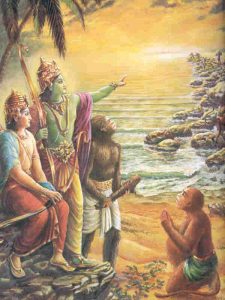 the same Rāma who, unable to make a bridge of arrows over the ocean, employed monkeys to build a bridge of stones? It was only then that His army could cross the ocean. If I had been there at that time, I would have built such a strong bridge of arrows that the entire army could have easily crossed over.”
the same Rāma who, unable to make a bridge of arrows over the ocean, employed monkeys to build a bridge of stones? It was only then that His army could cross the ocean. If I had been there at that time, I would have built such a strong bridge of arrows that the entire army could have easily crossed over.”
Hanumān replied very politely, “But your bridge would not have endured the weight of even the weakest monkey in Śrī Rāma’s army.”
Arjuna said, “I am going to make a bridge of arrows over this river and you may cross it with as heavy a load as you can carry.”
Hanumān then expanded himself into a huge form and jumped towards the Himālayan mountains. He returned with heavy stones tied to every hair on his body. As soon as he placed one foot on the bridge, it started to quiver, but surprisingly enough, it did not break.
Arjuna trembled in fear. Remembering his worshipable deity, Śrī Kṛṣṇa, he prayed, “O Lord! The honour of the Pāṇḍavas is in Your hands.”
When Hanumān put the full weight of both his feet on the bridge, he was astonished to find that it did not break. If the bridge did not break, it would be a matter of great shame for him. Within his heart, Hanumān remembered his worshipable Lord, Śrī Rāmacandra. Meanwhile, his glance fell below the bridge, where he saw not water flowing but streams of blood. Hanumān immediately jumped off the bridge and peered below it. “Oh! What is this?” he cried. “My worshipable Lord, Śrī Rāmacandra, is personally supporting the bridge of sharp arrows on His back!” He at once fell at the lotus feet of Śrī Rāmacandra.
At this same moment, Arjuna saw the Lord not as Śrī Rāma but as Śrī Kṛṣṇa. Both Hanumān and Arjuna lowered 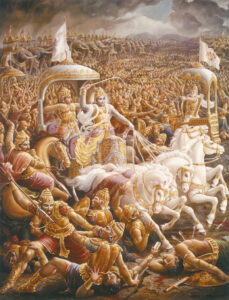 their heads in shame before their worshipable Lord, who said, “There is no difference between these two forms of Mine. I, Kṛṣṇa, in the form of Śrī Rāma, come to establish the limit of morality and proper religious conduct (maryādā), and in this very form of līlā-puruṣottama Kṛṣṇa, the Supreme Lord who enjoys transcendental pastimes, I am the personification of the nectar of all rasas. From today onward, you, who are both My servants, should become friends. In a battle in the near future, the mighty Hanumān, situated on the flag of Arjuna’s chariot, will give him protection in all respects.”
their heads in shame before their worshipable Lord, who said, “There is no difference between these two forms of Mine. I, Kṛṣṇa, in the form of Śrī Rāma, come to establish the limit of morality and proper religious conduct (maryādā), and in this very form of līlā-puruṣottama Kṛṣṇa, the Supreme Lord who enjoys transcendental pastimes, I am the personification of the nectar of all rasas. From today onward, you, who are both My servants, should become friends. In a battle in the near future, the mighty Hanumān, situated on the flag of Arjuna’s chariot, will give him protection in all respects.”
For this reason, Hanumān graced the flag of Arjuna’s chariot in the battle of Mahābhārata. Arjuna thus received the name Kapi-dhvaja, or one who has a monkey on his flag.

The following is an excerpt from Śrī Rāma-navamī by Śrīla Gaura Govinda Svāmī Mahārāja (tvpbooks.com)
Those who are rāma–bhaktas, devotees of Rāma, they want to see the Lord in the form of Rāma. In this connection it is said that Hanumānjī is a great and famous rāma–bhakta, a dāsya-bhakta, dāsye kape pati. Hanumānjī is still living here in this material world, in Kimpuruṣa-varṣa. He is still there engaged in chanting rāma–nāma. When Lord Rāma wound up His manifest līlā in Treta-yuga and went back to His abode in the spiritual world, He took everyone in Ayodhyā with Him, but He did not take Hanumān. He left him here and said, “You stay here and teach dāsya-bhakti.” Thus Hanumān is still here.
Śrīla Sanātana Gosvāmī has mentioned in his Bṛhat-bhāgavatāmṛta that once Lord Kṛṣṇa sent Garuḍa to Hanumān, “You go and tell Hanumān that I want to see him, he must come.” So Garuḍa went there. Hanumānjī was engaged in chanting rāma-nāma. Garuḍa approached him and said, “I have come from Dvārakā. Lord Kṛṣṇa has sent me. He wants you to come and see Him.” However, Hanumānjī did not listen. Garuḍa said it once, twice, thrice; He repeatedly said it. Then Hanumān became angry, and gave him a great lash with his tail. Garuḍa was hurled away and landed before Kṛṣṇa in Dvārakā. Kṛṣṇa understood what had happened. Kṛṣṇa asked, “What did you say to him?” Garuḍa said, “I told him that Kṛṣṇa wanted to see him in Dvārakā.” “Why did you say Kṛṣṇa? Go again and tell him that Lord Rāma wants to see him. Unless you say Rāma he’ll never listen. That is because he has aikāntikatā, unalloyed devotion or one-pointed devotion”. Hanumānjī is a great sādhu, he knows tattva. He has said,
śrīnāthe jānakī-nāthe cābhede paramātmani
tathāpi mama sarvasvo rāmaḥ kamala-locanaḥ
(Śrī Prema Bhakti-candrikā, Text 17)
“I know there is no difference between Śrīnātha and Janakīnātha, the husband of Śrī, Lakṣmījī and the husband 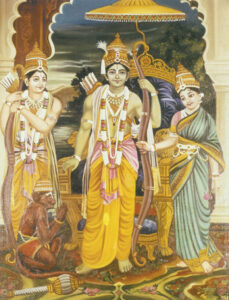 of Janakī, Sītā-devī. Both are paramātmā, parambrahma, but my heart and soul is the lotus-eyed Rāma, not Śrīnātha, Kṛṣṇa.” He knows that there is no difference, but still Rāma is the Lord of his heart.
of Janakī, Sītā-devī. Both are paramātmā, parambrahma, but my heart and soul is the lotus-eyed Rāma, not Śrīnātha, Kṛṣṇa.” He knows that there is no difference, but still Rāma is the Lord of his heart.
So Garuḍa went again and said, “Lord Rāma wants to see you.” Then Hanumān said, “Why didn’t you say Lord Rāma? My Lord has called, so I must go.” Garuḍa said, “Come and sit on my shoulder, I’ll fly you there.” “No, I don’t need you. You go, I will go by myself.”
When Garuḍa reached Dvārakā, Hanumān was already there. Garuḍa saw that Kṛṣṇa had assumed the form of Rāma, Balarāma had assumed the form of Lakṣmaṇa and Rukmiṇī had assumed the form of Sītā. She was standing and Hanumān was sitting beside Them with folded hands. Thus the Lord manifests the form the devotee wants to see.
Image/Art made possible by Pixabay.com, Krishnapath.org and/or Bhaktiart.net
